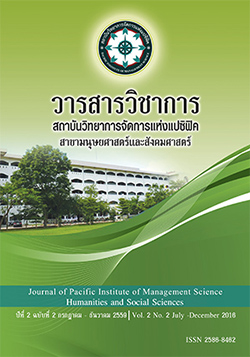Social capital of the community and lifestyle of community leaders according to the philosophy of sufficiency economy Ban Bua M 4, Tambon Ban Tun, Amphoe Mueang Phayao, Phayao Province
Keywords:
Social capital of the community, Lifestyle of community leaders, Philosophy of sufficiencyAbstract
This study has an objective to study the social capital of the community and the living of community leaders according to Sufficiency Economy Philosophy in Ban Bua M 4, Tambon Ban Tun, Amphoe Mueang Phayao, Phayao Province The instrument used for data collection include group discussion (Focus group). The sample of this research was formal community leaders and informal community leaders 24 persons. The study found that. The social capital of the lotus community is as follows: 1) Community cultural capital, including the tradition of raising ghost spirits, Ancestral spirit tradition, Traditions of philanthropy, Traditional merit day, Traditional Cantonese, Tradition New rice, Ordination ceremony and Songkran Festival. 2) Personal capital, including President of Tambon, Administration Organization Member of Tambon Administrative Organization Council And village committees in the community; 3) Community organization capital, including Weaving group and hyacinth group 4) Community grants are community networks, village funds and urban communities. Woven net and village committee networks; and 5) Intellectual capital, including wisdom, weaving, sampling, wisdom, doctor, blowing. And the beetle breeding wisdom. From the five community funds, it is important for people to live in the community, bringing wisdom to the people in the community. By guiding the Sufficiency Economy Philosophy. In terms of fit, be honest with yourself and the community, not luxuries, unity in the community. Can generate income for the community as well as the construc-tion of dams to store water vetiver. Reforestation and waste management.
References
เทพ วงศ์สุภา. (2548). ทุนทางสังคมกับการจัดการกองทุนหมู่บ้านและชุมชนเมือง (วิทยานิพนธ์ศึกษาศาสตร์ มหาบัณฑิต, มหาวิทยาลัยเชียงใหม่).
ธีรยุทธ บุญมี. (2551). ทุนทางสังคม. หนังสือชุดชุมชนเข้มแข็ง ลำดับที่ 3 (พิมพ์ครั้งที่ 1) สำนักงานกองทุนเพื่อสังคม ธนาคารออมสิน.
นวกานต์ แท่งทอง. (2554). ทุนทางสังคมกับการจัดการชุมชน : กรณีศึกษาตำบลเหมืองใหม่ อำเภออัมพวา จังหวัด สมุทรสงคราม (วิทยานิพนธ์รัฐศาสตร์มหาบัณฑิต มหาวิทยาลัยรามคำแหง).
นิธิ เอี่ยวศรีวงศ์ . (2542).ทุนทางสังคม. หนังสือชุดชุมชนเข้มแข็ง ลำดับที่ 3. (พิมพ์ครั้งที่ 1) สำนักงานกองทุนเพื่อสังคม ธนาคารออมสิน.
พระระวี เหลืองสวัสดี . (2545). ทุนทางสังคมในมุมมองแบบไทย วิทยานิพนธ์ปริญญามหาบัณฑิต สาขาศึกษาศาสตร์ บัณฑิตวิทยาลัย มหาวิทยาลัยมหิดล.
ไพบูลย์ วัฒนาศิริ. (2542). ในชุมชนเข้มแข็ง ทุนทางสังคมไทย. พิมพ์ครั้งที่ 3 กรุงเทพฯ : สำนักงานกองทุนเพื่อสังคมและธนาคารออมสิน.
รังสรรค์ ธนะพันธุ์ . (2546). ทุนวัฒนธรรม : วัฒนธรรมในระบบทุนนิยมโลกิเลม 1 กรุงเทพฯ : สำนักพิมพ์มติชน.
เสรี พงศ์พิศ. (2548). ทุนวัฒนธรรม. หนังสือรวบรวมบทความตีพิมพ์ในมติชนสุดสัปดาห์และรายวัน. สำนักส่งเสริม ความเข้มแข็งชุมชน. (2546). การดำเนินงานโครงการหมู่บ้านเศรษฐกิจพอเพียงต้นแบบ. กรุงเทพฯ : บริษัทบีที่เอสเพรส จำกัด
อเนก นาคบุตร. (2545). ชุมชนเข้มแข็ง ทุนทางสังคมไทย : หนังสือชุดชุมชนเข้มแข็ง ลำดับที่ 1 ( พิมพ์ครั้งที่ 4). สำนักงานกองทุนเพื่อสังคม : ธนาคารออมสิน
อุไรวรรณ พวงสายใจ. (2545). ทุนทางสังคมที่ส่งผลต่อความเข้มแข็งขององค์กรชุมชน. วิทยานิพนธ์มหาบัณฑิต สาขา การศึกษานอกระบบ บัณฑิตวิทยาลัยมหาวิทยาลัยเชียงใหม่.
อมรรัตน์ ทิพย์เลิศ. (2548). ความสามารถทางการสื่อสารของผู้นำท้องถิ่นในการบริหารจัดการทุนชุมชน. วิทยานิพนธ์ ปรัชญาดุษฎีบัณฑิต คณะวารสารศาสตร์และสื่อสารมวลชน มหาวิทยาลัยธรรมศาสตร์ .
สำนักงานท้องถิ่นจังหวัดพะเยา. (2558). กลุ่มงานข้อมูลสารสนเทศและการสื่อสาร. ข้อมูลสารสนเทศและการสื่อสาร. (ออนไลน์ ). แหล่งที่มา : http//phayao.go.th/hmproject/?page_id109.
สำนักงานพัฒนาชุมชนจังหวัดพะเยา. (2558). กลุ่มงานยุทธศาสตร์การพัฒนาชุมชน. แผนชุมชนบ้านบัว. พะเยา.
Downloads
Published
Issue
Section
License
บทความที่ได้รับการตีพิมพ์เป็นลิขสิทธิ์ของ สถาบันวิทยาการจัดการแห่งแปซิฟิค
ข้อความที่ปรากฏในบทความแต่ละเรื่องในวารสารวิชาการเล่มนี้เป็นความคิดเห็นส่วนตัวของผู้เขียนแต่ละท่านไม่เกี่ยวข้องกับสถาบันวิทยาการจัดการแห่งแปซิฟิค และคณาจารย์ท่านอื่นๆในสถาบันฯ แต่อย่างใด ความรับผิดชอบองค์ประกอบทั้งหมดของบทความแต่ละเรื่องเป็นของผู้เขียนแต่ละท่าน หากมีความผิดพลาดใดๆ ผู้เขียนแต่ละท่านจะรับผิดชอบบทความของตนเองแต่ผู้เดียว







